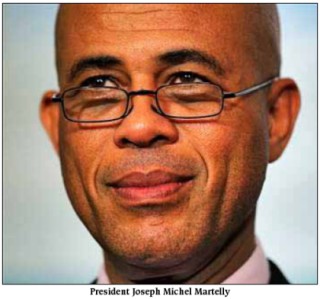|

On Mon., Apr. 30, 2012,
President Joseph Michel Martelly returned to Haiti after
spending two weeks in the U.S. to receive medical treatment.
Arriving at the
Toussaint Louverture International Airport accompanied by his
wife Sophia, Martelly was met by his political team and dozens
of supporters in an atmosphere described by Prime Minister
nominee Laurent Lamothe as "warm." Martelly thanked his
well-wishers for their support during his recent medical ordeal,
reportedly a pulmonary embolism.
In his remarks at the airport’s
diplomatic arrival lounge, like many Haitian leaders before him,
Martelly took the occasion to speak out against what doesn’t
work in the country, saying that he would fix things, which one
would expect considering that "change" was his campaign slogan.
While his predecessor, René Préval, used to blame the Haitian
Constitution of 1987 as the nation’s "source of instability,"
Martelly focused more on Haiti’s "weak institutions."
"As you can see, I'm standing
and in shape,” Martelly said in his remarks. “I’ve returned to
continue the work and to meet all the challenges of the moment.
I know all the problems that you have just undergone, problems
that arise from weaknesses in our institutions. That's why I've
always said that this work, I could not do it alone. We need the
people to be with us. You must help me in this fight. I need the
assistance of each Haitian, your involvement, your help, because
we have to win this fight. I take this opportunity to call on
the international community as well, so that it continues to
help us in strengthening our institutions. All the problems we
face today arise, again I regret to say, from the weakness of
our institutions. They lack the resources and money needed to
strengthen them.”
That was the president’s
declaration: weak institutions are responsible for all the
country’s misfortunes. While this can be acknowledged as a
half-truth, it must be noted that President Martelly has helped
to weaken, not strengthen, Haiti’s institutions, thereby
jeopardizing democratic achievements and efforts to build a rule
of law. Some examples illustrate this: the arbitrary and illegal
arrest on Nov. 27, 2011 of Deputy Arnel Belizaire; Martelly’s
intimidating and aggressive comportment towards journalists
doing their jobs; his tolerance of groups of heavily armed
former soldiers throughout Haiti; the murder of a merchant at
the Haitian/Dominican border by one of his closest associates;
illegal taxation of international money transfers and phone
calls, bypassing Parliament; the signing of international
treaties by interim ministers; scandals concerning corruption
and drug trafficking, just to name a few. All of this weakens
and destabilizes Haiti’s republican institutions.
On Wed., Apr. 25, in his first
public appearance since he arrived in Miami on Apr. 16, Martelly
said at a local radio station: "My health situation was very
complicated. I was very near death, and I was preparing to
accept it because the pain was so sharp. I'm not dead, because
God is by my side. I could not breathe, I could not speak, I
could not eat, I could not stand... I could not do anything. My
chest felt compressed, as if three people were standing on me."
Despite this declaration, there
remain doubts about what illness he may have had or whether he
was really ill at all. Three senators – Kely C. Bastien, Joel
John Joseph and Edwin Zenny – traveled from Haiti to visit
Martelly on his sickbed in the United States.
Despite his illness, Martelly
remains dogged by a corruption scandal in which Dominican
Senator Felix Bautista is reported to have given him about $2.6
million in bribes. Guillermo Moreno, the presidential candidate
of the Dominican Republic’s "Alianza Païs" party has asked that
Martelly return a medal which Dominican President Leonel
Fernandez gave him on Apr. 2.
In a letter addressed to
President Martelly via the Dominican Foreign Ministry, candidate
Moreno, who ranks third in the Dominican presidential race,
argued that Martelly is not of the stature required to be a
recipient of the Dominican Republic’s most prestigious honor
because of the corruption scandal in which he is reportedly
involved.
"Someone who receives an award created in memory of
[Dominican Republic founder] Juan Duarte – the Order of Duarte
Sanchez y Mella – must deserve it, yet we believe that because
of corruption scandals in whose center is the Haitian president,
Joseph Michel Martelly, he does not deserve such an honor,”
Moreno wrote. The leader of the Alianza Pais also questions the
fact that President Martelly has not presented any evidence to
prove that he was not involved in receiving kickbacks from
Senator Bautista for providing his companies with lucrative
construction contracts. |